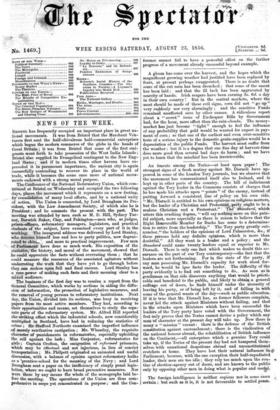NEWS OF THE WEEK.
Banner. has frequently occupied an important place in great na- tional movements. It was from Bristol that the Merchant Ven- turers first sent the half-chivalrous half-commercial enterprises which began the modern commerce of the globe in the hands of Great Britain ; it was from Bristol that some of the first emi- grants went forth to take possession of the West India Islands ; Bristol also supplied its Evangelical contingent to the New Eng- land States ; and if in modern times other havens have su- perseded it in paramount importance, the ancient city is again successfully contending, to recover its place in the world of trade, while it becomes the scene once more of national move- ments endowed with a strong moral purpose.
The Conference of the National Reformatory Union, which com- menced at Bristol on Wednesday and occupied the two following days, places the movement which it represents on a new footing, by consolidation of many local efforts, and by a national unity of action. The Union is connected, by Lord. Brougham its Pre- sident, with the Law Amendment Society, of which also he is President ; and he connects the present with the past. The meeting was attended by men such as M. D. Hill, Sydney Tur- ner, Barwick Baker, Clay, and Pakington—men who, as judges prison-officers, reformatory managers, legislators, and practical students of the subject, have examined every part of it in the working. The inaugural address was delivered by Lord Stanley, who devotes himself less and less to party politics, now degene- rated' to chief._ and more to practical improvement. Few men of Parliament have done so much work. His exposition of the statistics, the history, and moral of the movement, showed that he could appreciate the facts without overrating them ; that he could measure the resources of the associated agitators without underrating the work that they have yet to go through before they can reckon upon full and final success. Lord Stanley has a rare power of making such facts and their meaning clear to a mixed audience.
The business of the first day was to receive a report from the General Committee, which works by sections in aiding the diffu- sion of information, the promotion of legislative measures, and the removal of young persons to reformatory institutions. Next day, the Union, divided into its sections, was busy in receiving papers from its most active members. They had, according to their opportunities and means, set themselves to study the sepa- rate parts of the reformatory system. Mr. Alfred Hill reported the striking effect which the industrial schools, now considerably multiplied in Scotland, have had in reducing the statistics of crime ; Sir Stafford Northcote examined the imperfect influence of merely retributive castigation ; Mr. Wheatley, the requisite character of punishments in reformatories, especially upholding the cell against the lash ; Miss Carpenter, reformatories for girls ; Captain Crofton, the emigration of reformed prisoners, Which may be effectual and not injurious, in lieu of convict transportation ; Mr. Philpott originated an animated and useful discussion, with a balance of opinion against reformatory hulks as a 'prentice-school for the manning of the Navy ; and Lord Brougham sent a paper on the inefficiency of simply penal legis- lation, where we ought to have broad preventive measures. Nor were these by any means the whole of the monographs laid be- fore the meeting. The operations of the Union are thus com- prehensive in scope yet concentrated in purpose;' and the Con-
ference cannot fail to have a powerful effect on the further progress of a movement already successful beyond example.


























